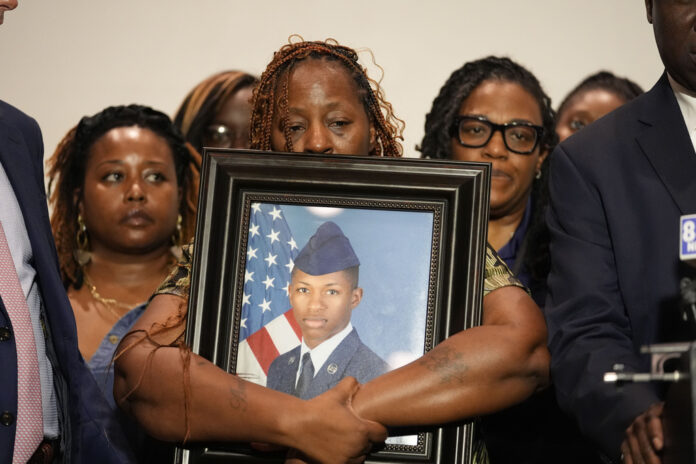
FORT WALTON BEACH, Fla. (AP) — A Florida sheriff released body camera video Thursday showing a deputy outside an apartment door and firing immediately when it was opened by a Black man carrying a handgun pointed downward, a killing the family denounced as “unjustifiable.”
Okaloosa County Sheriff Eric Aden presented the video hours after the family of U.S. Air Force Senior Airman Roger Fortson and their attorneys held a news conference in which they disputed that the deputy acted in self-defense. Aden rejected assertions made by civil rights attorney Ben Crump, who is representing Fortson’s family, that the deputy had gone to the wrong apartment, covered the door’s peephole and did not announce himself.
The video shows the deputy arriving at a Fort Walton Beach apartment building on May 3 and speaking to a woman outside who described someone hearing an argument. The deputy then went up an elevator and walked down an outdoor hallway.
The video shows the deputy banging on the door and stepping aside, seemingly out of view of the door. Twice he shouted: “Sheriff’s office! Open the door!”
Fortson opened the door and could be seen holding what appeared to be handgun pointed down toward the floor. The deputy shouted, “Step back!” and fired off shots. He then shouted, “Drop the gun! Drop the gun!”
“It’s over there,” Fortson said.
“Drop the gun!” the deputy yelled back.
“I don’t have it,” Fortson said, lying on the ground.
The deputy then called paramedics on his radio.
The sheriff’s office has declined to identify the responding deputy or his race. The deputy was placed on administrative leave pending an investigation.
Crump released a statement later noting that the officer did not tell Fortson to drop his gun before shooting “multiple times within a split second of the door being opened.”
“We remain adamant that the police had the wrong apartment as Roger was on the phone with his girlfriend for a substantial amount of time leading up to the shooting, and no one else was in the apartment,” the statement said.
Crump also told reporters earlier that Fortson was talking to his girlfriend on FaceTime and that he grabbed his gun because he heard someone outside his apartment. He said that the deputy burst into the apartment, citing the account of the girlfriend, who has not yet been identified.
“The girlfriend acknowledges that even though she initially thought the door was forced open by the police that she stands by her emotional recollection of what happened,” Crump’s later statement said.
In a clip from the FaceTime video captured by Fortson’s cellphone, the airman can be heard groaning and saying, “I can’t breathe.” A deputy can be heard yelling back at him, “Stop moving!” The phone is pointed at the ceiling and does not show what is going on in the apartment.
Aden said he had met with the family Thursday and extended his deepest condolences.
“This result is one we never hope to encounter,” Aden said. “These investigations take time, but I want to assure you that we are not hiding or attempting to cover anything up.”
Officials have said the Florida Department of Law Enforcement is investigating. FDLE spokeswoman Gretl Plessinger told The Associated Press on Wednesday that it is unlikely the agency will have any further comment until the investigation is complete.
The sheriff said the probe was being handled as a criminal investigation and that no determination had yet been made on whether the deputy’s actions were justified or not. However, the initial news release from the sheriff’s office that described the shooting said that the deputy “reacted in self-defense after he encountered a 23-year-old man armed with a gun.”
Fortson’s mother, Chantemekki Fortson, walked into the morning news conference with Crump holding a framed portrait of her son in his dress uniform. She burst into tears as Crump spoke about her son’s death.
“My baby was shot up,” she said.
Crump called the shooting “an unjustifiable killing.”
“For whatever reason, they thought he was a bad guy, but he was a good guy. He was a great guy. He was an exceptional guy,” Crump said. “They took a patriot from us.”
Crump said Fortson, originally from Atlanta, was shot six times.
Fortson enlisted in the Air Force after graduating high school, Crump said. He was based at the Special Operations Wing at Hurlburt Field. As a special missions aviator, one of his roles was to load the gunship’s cannons during missions.
Crump, based in Tallahassee, Florida, has been involved in multiple high-profile cases of Black people in fatal encounters with law enforcement and vigilantes, including those of Ahmaud Arbery, Trayvon Martin, Tyre Nichols, George Floyd and Breonna Taylor, who was also killed in her home during a no-knock police raid that targeted her ex-boyfriend in 2020.
Fortson’s death draws striking similarities to other Black people killed in recent years by police in their homes.
In 2018, a white Dallas police officer fatally shot Botham Jean, who was unarmed, after mistaking his apartment for her own. Amber Guyger, the former officer, was convicted of murder and was sentenced to 10 years in prison.
In 2019, a white Fort Worth, Texas, officer fatally shot Atatiana Jefferson through a rear window of her home after responding to a nonemergency call reporting that Jefferson’s front door was open. Aaron Dean, the former officer, was convicted of manslaughter and sentenced to nearly 12 years in prison.
Crump represented families in both cases as part of his effort to force accountability for the killings of Black people at the hands of police.


